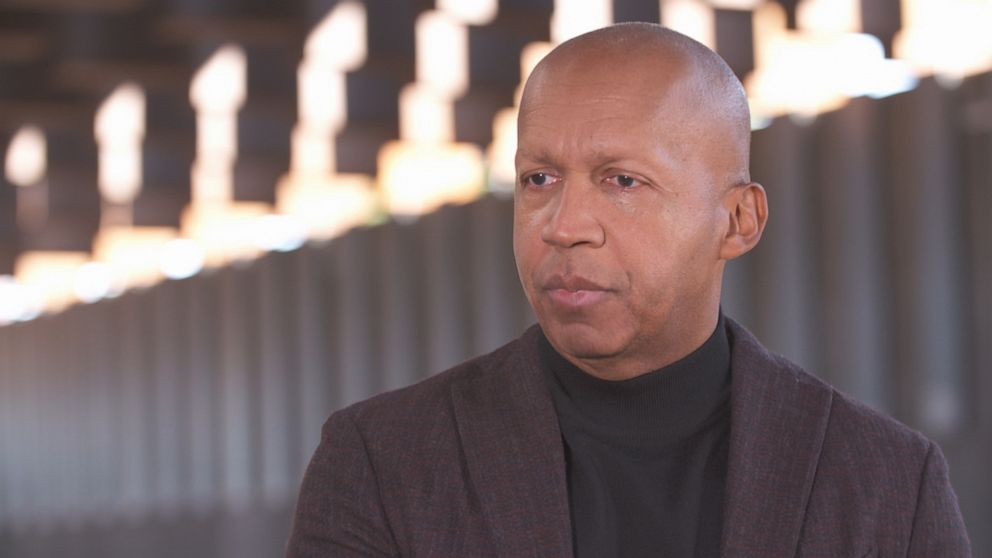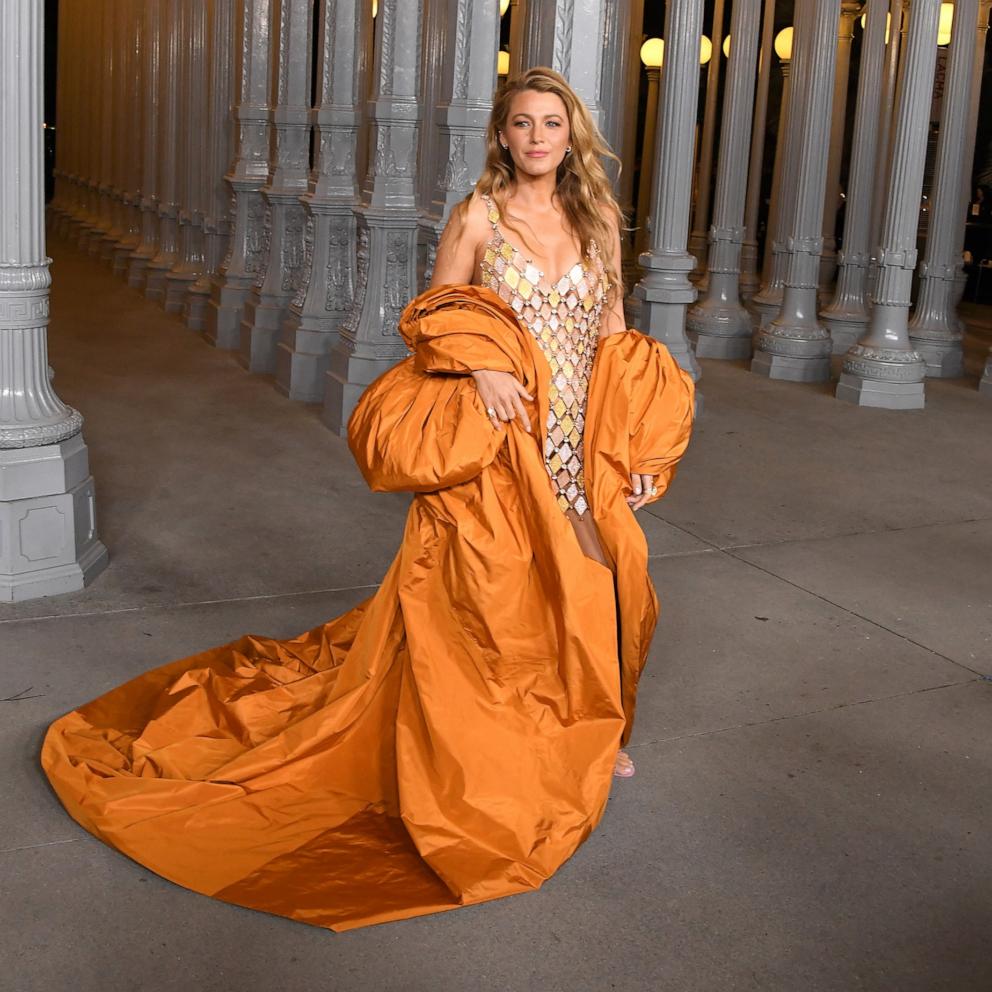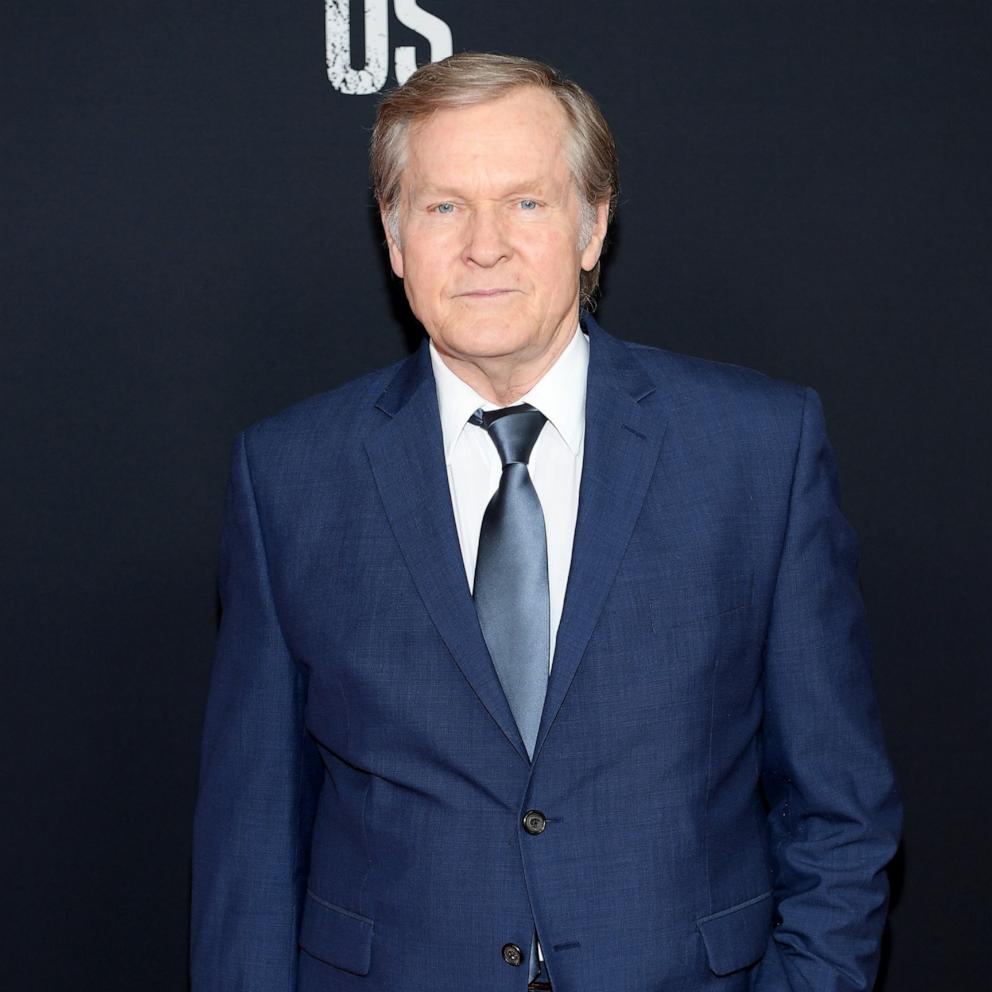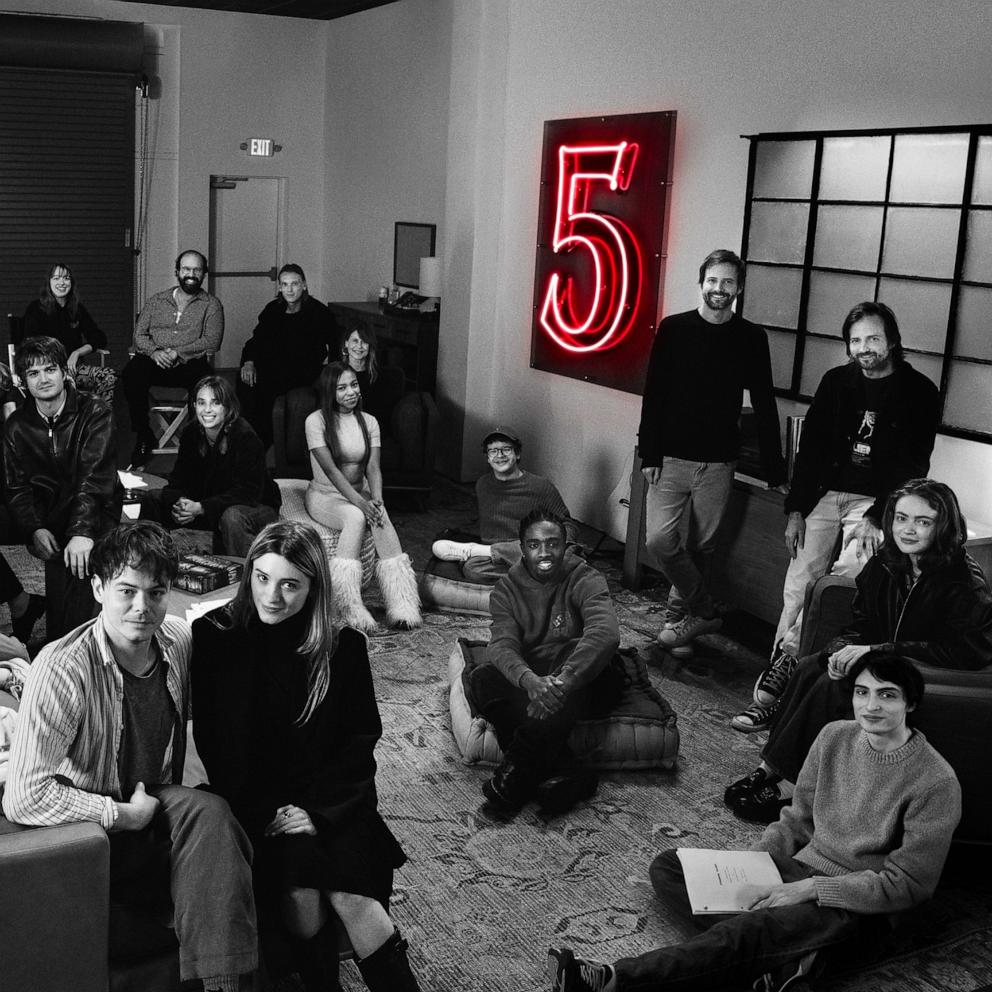'Do we deserve to kill?' Attorney and exonerated death row inmate talk about the real story behind 'Just Mercy'
A brass star on the Alabama State Capitol's portico marks the location where Jefferson Davis was inaugurated as the first and only president of the Confederacy. Today, just a mile away, atop a grassy knoll, a new kind of monument stands.
As visitors walk through the National Memorial to Peace and Justice in Montgomery, over 800 corten steel columns hang solemnly overhead. Each column is listed by state and county and engraved with the names of African Americans who were lynched.
If those rust columns are reminiscent of hanging black bodies, Bryan Stevenson, who envisioned this memorial, says that is exactly the point.

"There were lynchings that took place where they would hang someone and then they wouldn't let the family cut the body down for four days because they wanted other people of color to see that hanging, to see that violence," Stevenson told "Nightline." "I think people don't know what it was like to live in a space where you were surrounded by such torture and terror and violence and nobody did anything, and I think we wanted people to have an appreciation of that."
Stevenson is an attorney and founder of the Equal Justice Initiative, the organization that created the memorial, which honors the 4,400 African Americans lynched between 1877 and 1950.
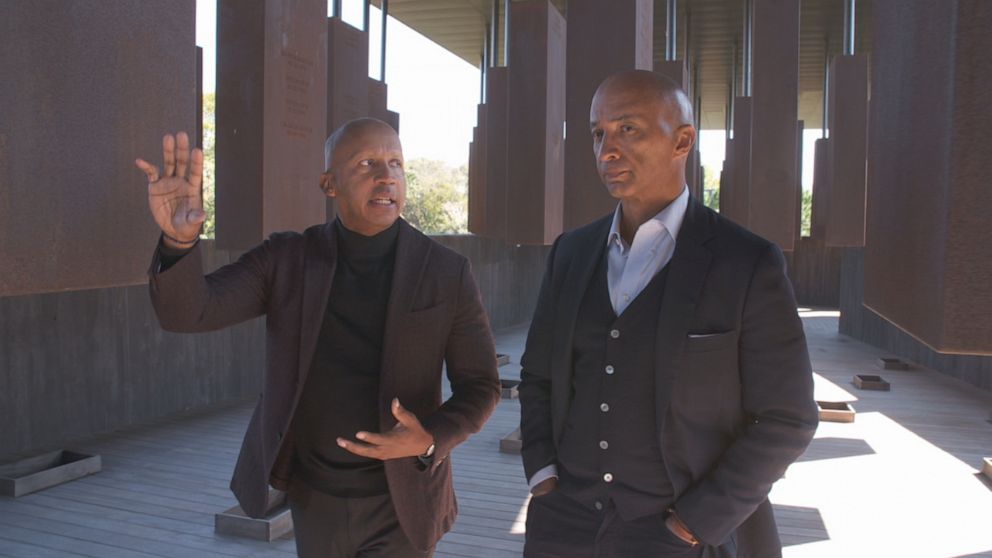
Stevenson said the memorial directly relates to his work.
"We have the death penalty. We have 2.2 million people in jails [and] in prisons. We have the highest rate of incarceration in the world because we've allowed ourselves to be governed by fear and anger," Stevenson said. "The politics of fear and anger are what created this epidemic of incarceration, and we have to challenge that and we have to remind people that it was that same politics of fear and anger that allowed us to engage in a native genocide and slavery and lynching and segregation."
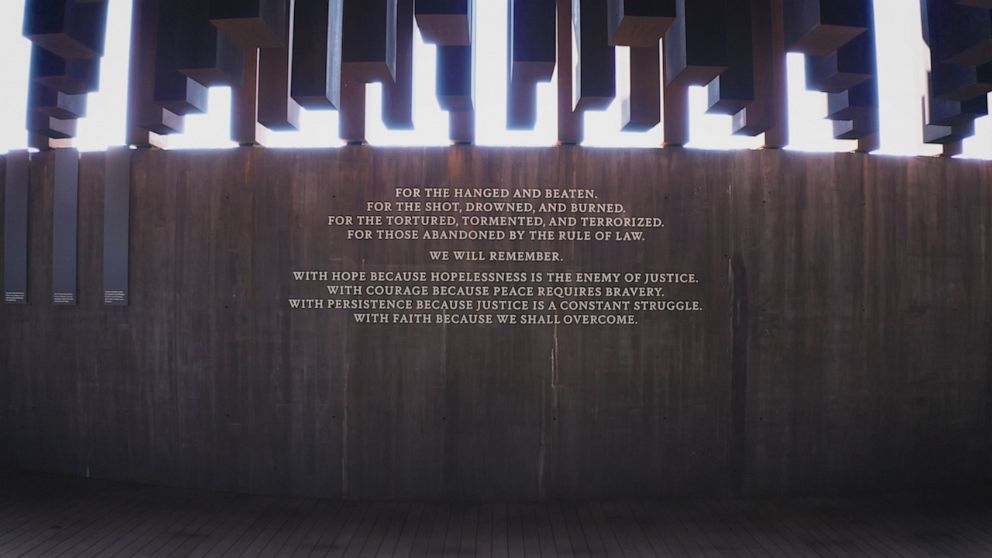
Since the 1980s, Stevenson has dedicated his life to fighting for justice, working with his organization to remove more than a hundred men and women from death row. Speaking to "Nightline" co-anchor Byron Pitts, he remembered being reticent to speak to the media at the beginning of his career.
"I did not want much attention. We didn't have a sign on our building until just a few years ago," he said. "We just didn't want to do that because I didn't think it was going to help my clients get the justice that they needed."
Now, Stevenson is the subject of a documentary, a best-selling author and the inspiration for a new Warner Bros. film, "Just Mercy," which is based on his memoir of the same name.
"I hope from watching the movie and thinking more critically, people will kind of see this issue the way I see it,'" Stevenson said. "I don't think the threshold question of the death penalty is, 'Do people deserve to die for the crimes they've committed?' I think the threshold question is, 'Do we deserve to kill?'"
Stevenson urges Americans to ask themselves, "Do we deserve to kill…if we have a system of justice that treats you better if you're rich and guilty than if you're poor and innocent? If we're unreliable, if we tolerate errors, if we have innocent people on death row, if it's compromised by bias and racism…then we don't deserve to kill. And I don't think that's a crazy argument."
Actor Michael B. Jordan portrays Stevenson in the new film while Academy Award winner Jamie Foxx plays one of Stevenson's first clients, Walter McMillian.
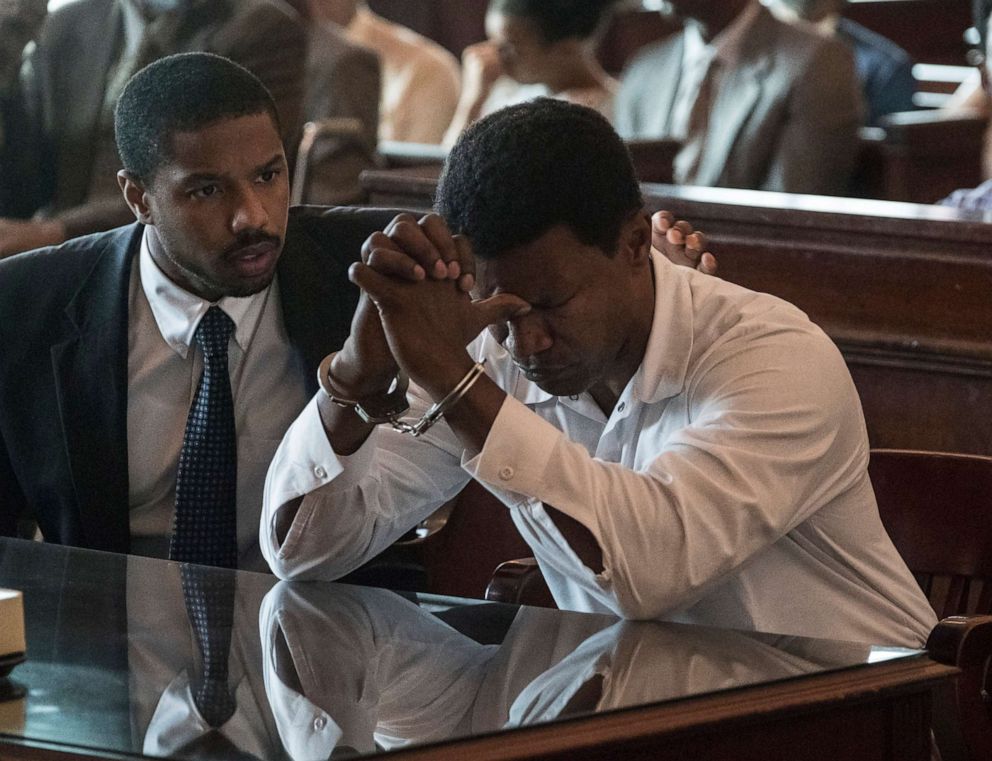
McMillian was convicted in 1988 for the murder of a young white woman in Monroeville, Alabama. Despite multiple alibi witnesses, the judge overrode the jury's sentencing verdict of life in prison and sentenced him to death. Yet, he was held on death row even before his trial.
Stevenson, who was a young lawyer fresh out of Harvard at the time, was able to prove that the state's witnesses had lied on the stand and the prosecution had illegally suppressed exculpatory evidence. In 1993, McMillian's conviction was overturned by the Alabama Court of Criminal Appeals and he was released.
Jordan said he was "intimidated to portray somebody like" Stevenson on screen.
"Nobody's perfect, but he's close. He's really, really [a] much better person than I am," Jordan said. "That makes me want to do better."
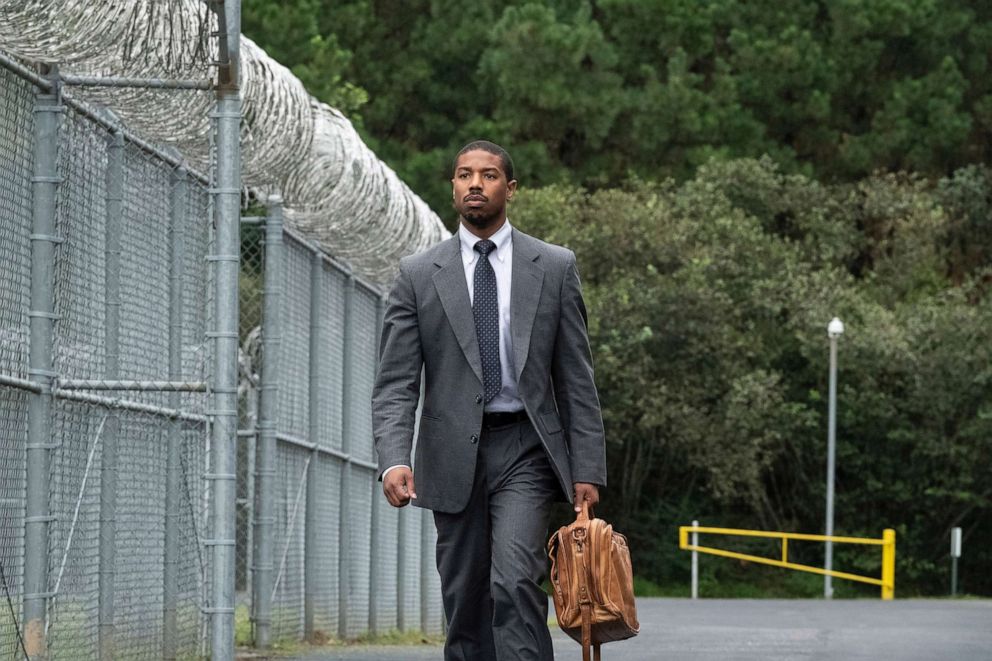
"I wanted to make sure as many people as possible could see his story and know his work," Jordan added. "He's really beaten the drum for justice nonstop. He's dedicated his life to it."
Foxx told "Nightline" he believes "Just Mercy" is the "most important movie I've ever done."
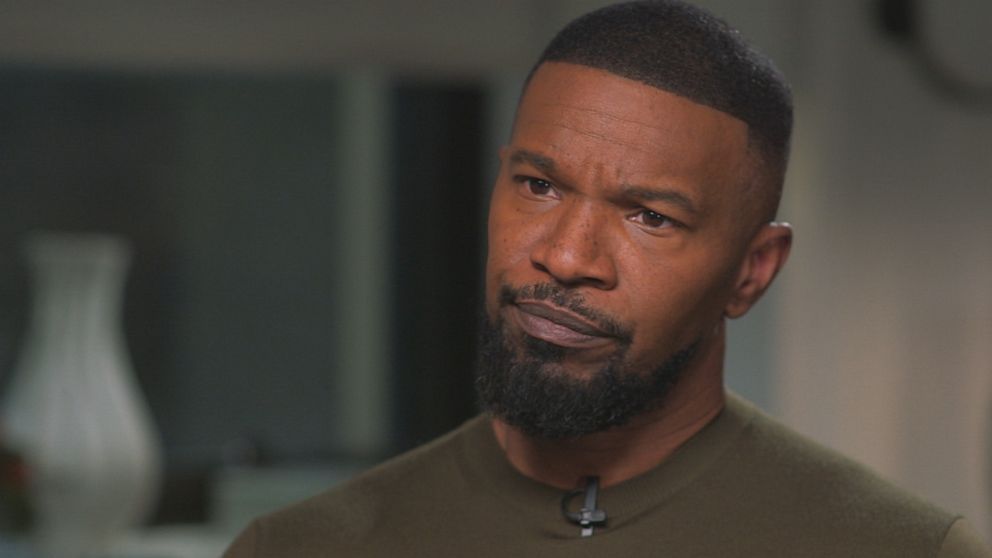
"I'm talking about the importance of the message, of what this is, of what we're dealing with today," Foxx said. "Here's Walter McMillian, in a sense, a person wrongly convicted of a crime [in] a city he had never been in, [a] person he'd never met, and all of a sudden, he sits on death row…before his trial."
In the film, McMillian tells Stevenson, "You don't know what it is down here, to be guilty from the moment you're born."
Foxx said "this was one line that I actually expressed to [director] Destin [Daniel Cretton]."
"I grew up in Texas. I love where I'm from. I love the South. But there were certain racial components that I was met with at an early age. I was 8 years old, and I got called 'n-----' by a grown man," he said. "How is me being born, how can I receive all of this hate?"
"When Jamie plays Walter, I think…he exposed the agony of being wrongly convicted and the pain and anguish of being separated from your family… The trauma of having to live through this horrific intimacy with death and execution," Stevenson said. "I think if people can see the real clients, the real people, they'll care more about the fact that we continue to tolerate so much injustice."
Stevenson said he's "really honored" to have Jordan in the film.
"He was terrific. I think he does an amazing role in the film, and the only thing I asked him not to do, which would push the boundaries a little bit, is I asked him not to go on some lawyer diet," Stevenson said. "I said, 'You can keep the 'Creed' [and] 'Black Panther' body when you play me."
Jordan, a star known for those films as well his breakout role in "Fruitvale Station," is also one of the movie's producers. With "Just Mercy," Jordan pushed to include an inclusion rider, which ensures people from underrepresented groups are heavily considered for roles behind the camera, such as people of color, women, LGBTQ and disabled people.
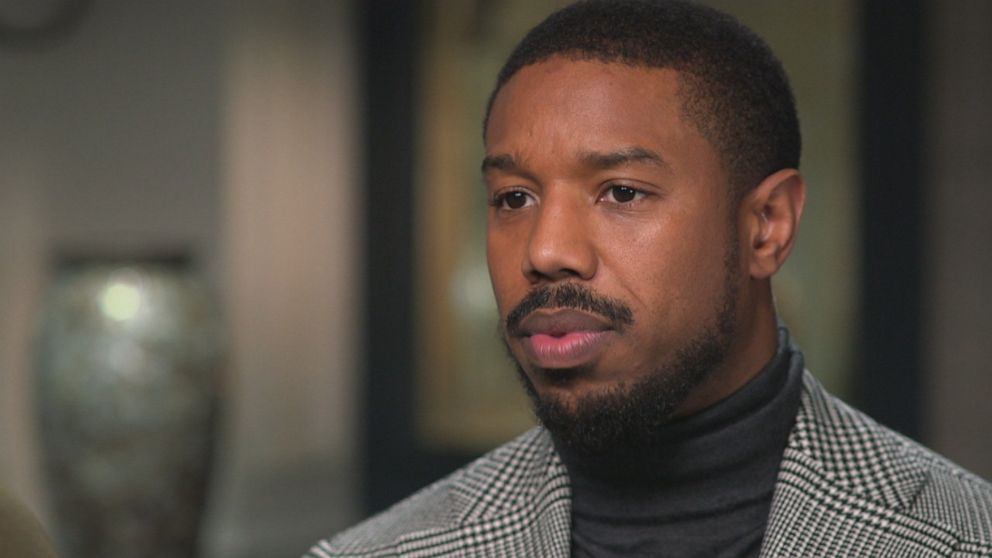
Jordan said he was inspired by an Academy Awards speech by Frances McDormand.
"I heard her mention it and I was sitting in the audience, and I was, like, 'Wow, OK. There's something I could actually put in writing. It's something that I could actually enforce through my production company.' And that holds me and whoever I work with accountable. So I pushed for it," Jordan said.
"It gives people the opportunity, you know? It's human nature, sometimes, to continue to work with people that you're used to working with. You hire friends. You hire, you know, people that you previously work[ed] with," he continued. "That creates a circle that keeps people on the outside. So this just allows people to get their foot in the door. So now all of Warner Media and all the companies under that umbrella all use our inclusion rider as they hire."
Anthony Ray Hinton is one of the 135 people Stevenson has helped off death row with the Equal Justice Initiative. "Nightline" first met Hinton in 2015 when he had just gotten off death row in Alabama after being wrongly imprisoned for 30 years for two murders he did not commit.
"I try to get up every morning and live the best life that I can live," Hinton told "Nightline." "There's nothing in this world that's more important than freedom. And when you lose your freedom, you lose it in a way that you're being told what to eat, what to wear, who can come see you...how long you can talk on the phone, or whatever. You lose everything."
Now, thanks to Stevenson, Hinton gets to live life on his own terms. Hinton joined the Equal Justice Initiative as a community educator, traveling to universities and seminars to share his story. He's even written a book: "The Sun Does Shine," which became a New York Times best seller.
Those decades incarcerated, however, have left a mark that even time cannot heal.
"No one sees when I'm at home, by myself — the tears. No one sees the scars that are perhaps there forever," Hinton said. "I lived in a fear. I feared that any night, the police could kick the door down, and say I did something."
Hinton said he holds that fear to this day. "Absolutely… If they did it once, they can do it again," he said.
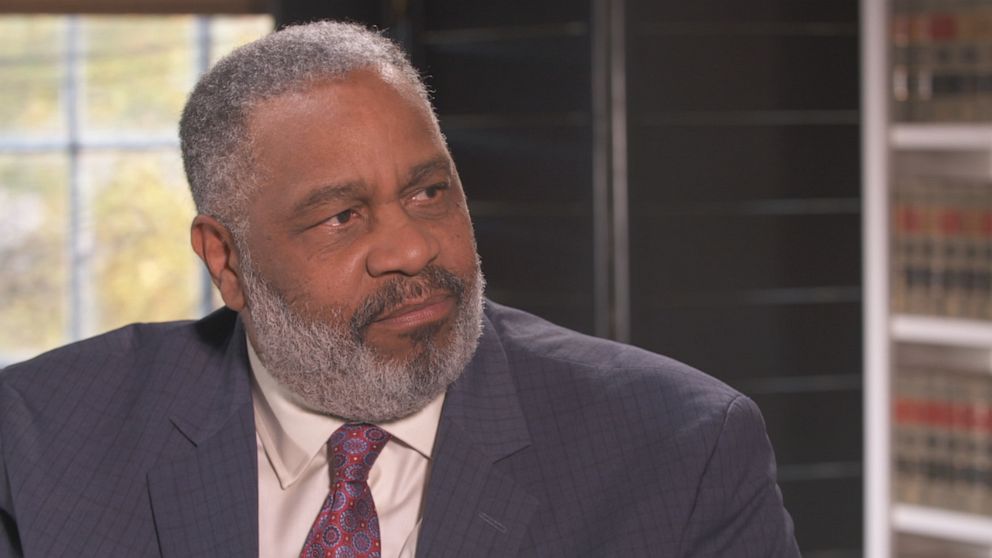
"Just Mercy" opens at a relevant time. The Department of Justice recently announced it will resume death penalty executions at the federal level after a nearly two-decade lapse.
"I believe that if people saw what I see on a regular basis, if they saw children being condemned to die in prison, if they saw mentally ill people being abused, they would want change. But our system is so insulated, they don't see it," Stevenson said.
Jordan hopes that audiences won't feel defeated by the enormity of injustice in our legal system.
"Find out who your prosecutor is in your community. Find out what bills and policies are being passed that directly affect your circumstances in your community. You know, get out and vote on those things. Speak on those things," Jordan said.
Stevenson said it's vital to continue to have hope for change — something Rosa Parks helped him realize.
"She made me understand that you have to believe things you haven't seen," Stevenson said. "That your hope is your superpower… That can be challenging and it can be exhausting, but it is necessary."
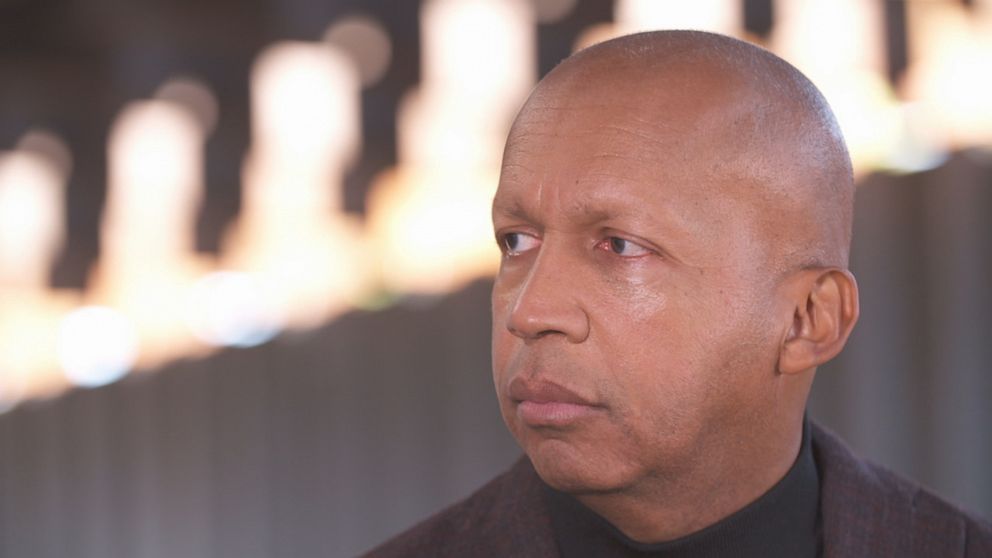
"I think injustice prevails where hopelessness persists, and so hope has to be your orientation," Stevenson said. "I had to believe I could be a lawyer… I had to believe I could be something I hadn't seen, but [that's] what the Montgomery bus boycott was about, it was a hope that we could actually end segregation, and that has absolutely defined my work."
Stevenson believes "we can do better."
"The reason why I'm talking about slavery and lynching and segregation is not because I want to punish America, I just think there's something better waiting for us," he said. "I think there's something that feels more like freedom, that feels more like equality, that feels more like justice than what we've experienced."
"Just Mercy" is in theaters everywhere on Jan. 10.
